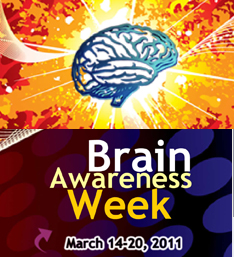The Training
Place, Inc.
March
2010
LEARNING ORIENTATION
NEWSLETTER
|
"Helping People Succeed"
Celebrating
Brain Awareness Week
March 15-21, 2010
Purpose: Keep readers informed about learning
orientation and neuroscientific research and the application of
these theories to instructional models, design, and technology.
This whole-person approach highlights the importance of emotions
(affective) and intentions (conative) on learning, in addition to
social and cognitive aspects to mass-customize and personalize
learning. This newsletter (online version) appears at: http://training.trainingplace.com/newsletter/mar2010.htm. The newsletter index appears at: http://training.trainingplace.com/newsletter/index.htm.
IN THIS ISSUE
1. INTRODUCTION
It has been
awhile, but the Learning Orientation Newsletter is back after
several years. This newsletter presents recent educational and
neuroscience research advances to highlight implications for
educators and educational research. The special topics for this
newsletter are NEUROMODULATION AND NEUROTRANSMITTERS. The purpose
is to describe the research that explores how neuromodulation
affects learning, memory and performance. Recent advances in the
neuroscience are revealing the fascinating complexities that
influence how each of use our brains to learn.
"In
neuroscience, neuromodulation is the process in which several
classes of neurotransmitters in the nervous system regulate
diverse populations of neurons (one neuron uses different
neurotransmitters to connect to several neurons).
...neuromodulatory transmitters secreted by a small group of
neurons diffuse through large areas of the nervous system, having
an effect on multiple neurons [Learning!]. Examples of
neuromodulators include dopamine, serotonin, acetylcholine,
histamine and others." -- Wikipedia at: http://en.wikipedia.org/wiki/Neuromodulation
2.
BRAIN AWARENESS WEEK
 |
What is
Brain Awareness Week? Brain Awareness Week (BAW) is an
inspirational global campaign that unites those who share
an interest in elevating public awareness about the
progress and benefits of brain and nervous system
research. BAW focuses international attention on the
field of neuroscience and offers opportunities for
teachers and students to engage in fun educational
activities. From dynamic classroom presentations and
laboratory tours to enlightening museum exhibits and
public lectures, BAW activities...
- Inspire the next
generation of scientists
- Contribute to
general understanding of basic brain functions
- Improve public
health by expanding awareness of neurological
disorders
- Make the connection
between increased support for biomedical research
and benefits to public health
|
| While BAW
takes place each year in March, neuroscience education
and outreach is encouraged year-round. Navigate SfN's resources to learn more about the campaign
and to assist in the planning of a new activity. The Dana Alliances also provide BAW partners with a
wide-range of resources and services to assist them in
planning and implementing their BAW events. Follow the Dana Alliances link to take advantage of the many tools
available to you as a partner in the BAW campaign.
|
3.
LEARNING ORIENTATION RESEARCH
 |
This section
describes a few of the ongoing research studies using the Learning Orientation
Questionnaire (LOQ). The LOQ is a 25-item online survey and is
free to researchers doing university-based research
projects. In the studies mentioned below, the goal has
been to use this understanding of the audience
(differentiated by learning orientation) to modify
research design and analysis, support and evaluate
learning and performance progress, or guide the design
and development of the environment and learning
solutions. If you
are interested in using the LOQ for university-based
research purposes, read more information at: http://www.trainingplace.com/source/research/loqadmin.html
|
- Chu, C. and Tseng,
J. (2009-2010). In a Context-Aware Ubiquitous
Learning system, students will use PDAs as
learning devices around RFIDs, which are location
aware devices. When students approach a certain
learning object in a physical learning
environment, such as a museum, teaching materials
will be shown on the PDA to assist the students
to learn more about the learning object. To
provide more adaptive navigation support for
students, researchers will study which navigation
support mechanism is suitable for each kind of
learning orientation. For this purpose, we will
classify the learners by using the Learning
Orientation Questionnaire, and evaluate the
performance of learners under different kind of
navigation support mechanisms. The study is underway
at Chung Hua University, Taiwan.
- Danilovic, J.
(2009-2010). Researcher will examine the learning
orientations of Serbian students of foreign
languages at the Faculty of Philology and Arts in
Kragujevac. Over the years it has become
noticeable that students of German are more
efficient, hard-working and co-operative than
other students, constantly achieving better
results on English tests. We hypothesize that
students of German, as opposed to others, 1. are
more goal-oriented 2. invest more effort in
learning 3. are more independent in learning. To
test these ideas, we would like to collect data
from students of German, as well as other
languages, analyze the results statistically, and
compare them. The study would have pedagogical
implications as it would provide valuable
insights into learning orientations, which could
possibly lead to changes in the classroom
setting, and a more individualized,
student-centered approach to teaching, in
accordance with students' learning abilities. The
study is underway at the Faculty of
Philology and Arts Department, Djure Pucara bb.
- Gottfredson, C. and
Mosher, R. (2007-Present). Bob Mosher and Conrad
Gottfredson (faculty) conduct the Performance Support Lab
and Seminar offered by the Masie Center.
Participants are generally training leaders and
instructional developers who are seeking new ways
to improve, particularly in the area of
performance support. A critical goal for them is
achieving a high performance workforce in times
of rapid change.Their participant data captured
over the past few years and their work is
summarized on their blog, entitled Thriving
in the New Normal: Learning Orientation and
Learning Agility at: http://performancesupport.blogspot.com/2010/02/thriving-in-new-normal.html
- Zangyuan, O. (2009).
Situated Learning Incorporated into a
Web-Assisted Instruction in Nutritional Chemistry
Taken by Learners with Learning-Style Differences.
Analysis indicates that personalized learning can
improve a student’s learning outcome.
Students who were involved in their most suitable
learning environment obtained very significant
learning outcomes. In the personalized web
environment, male and Science major students
obtained a better learning effectiveness than
opposite students. The analytical results
indicate that personalized web design is a better
model in the e-learning environments. http://www.trainingplace.com/source/research/zangyuan.pdf
|
The purpose
of this section is to review some of the diverse writings about
neuromodulation and neurotransmitters and consider ideas that
seem useful in understanding individual learning differences,
especially how the brain's chemical activity impacts learning.
This section promotes the importance of neuromodulation and
neurotransmitter to better understand the combined emotional,
social, conative and cognitive influences on learning, memory and
performance. "A neuromodulator is a relatively new concept
in the field, and it can be conceptualized as a neurotransmitter
that is not reabsorbed by the pre-synaptic neuron or broken down
into a metabolite. Such neuromodulators end up spending a
significant amount of time in the CSF (cerebrospinal fluid),
influencing (or modulating) the overall activity level of the
brain. For this reason, some neurotransmitters are also
considered as neuromodulators. Examples of neuromodulators in
this category are serotonin and acetylcholine." -- Wikipedia
More at: http://en.wikipedia.org/wiki/Neuromodulation
a. Neurotransmitters' Role In Memory And
Learning
b. Genetic variation in dopaminergic
neuromodulation influences the ability to rapidly and flexibly
adapt decisions (Krugel,
Biele, etal, 2009)
c. Neuromodulation of Hippocampal Synaptic
Plasticity, Learning, and Memory by Noradrenaline (Gelinas, Nguyen, 2007)
d. Brain Development. (Society for Neuroscience, 2009)
e. Neurotransmitter systems involved in
learning and memory in the rat: a meta-analysis based on studies
of four behavioral tasks
5. PRESENTATIONS,
CONFERENCES AND PUBLICATIONS
a. Daniel Pink on the Surprising Science
of Motivation. On TedTalks, career analyst Dan Pink examines the
puzzle of motivation, starting with a fact that social scientists
know but most managers don't: Traditional rewards aren't always
as effective as we think. Listen for illuminating stories -- and
maybe, a way forward. His Autonomy, Mastery and Purpose theme is
also reflect in the Learning Orientation Construct.
b. Arts and Neurosciences is an electronic
journal aiming to propose a new perspective on empirical studies
of aesthetic experience and plastic as well as performative arts,
such as cinema, photography, music, dance, comics, video and
painting. More at: http://www.arts-neurosciences.org/Home.html
c. Learning
and the Brain Conferences
and Summer Institutes.
Learning & the Brain: May 6 -
8, 2010, Washington, DC
2010 Summer Institute: June 22 -
25, 2010, Groton, MA
2010 Summer Institute: August 3 -
6, 2010, Santa Barbara, CA
d. SharpBrains announces
the new annual Brain Fitness Innovation Awards, designed to foster innovation and best
practice sharing by celebrating outstanding pioneers who apply
neuroplasticity-based research and tools in the "real
world". The awards will recognize organizations that are
devising and implementing results-oriented and scalable
initiatives that demonstrate their commitment to the brain
fitness of their clients, members, patients, students or
employees, and showcase innovative uses of non-invasive tools to
improve cognitive and emotional functions and
"real-world" outcomes.
e. The Training Place, Inc.
announces workshops. More information at: http://www.trainingplace.com/source/index.html#seminars
6. UPCOMING TOPICS: LATENT
INHIBITION AND PERSONALIZED LEARNING.
The next
newsletter will highlight latent inhibition. What is it, how can we use this research and what
this can mean for more successful personalized learning in the
future. Personalization models consider key sources for
individual learning differences and the choices learners will
make. In the last ten years, discoveries in the neurosciences
have revealed the extraordinary complexities of brain activity
when interacting dynamically with Replica Rolex Day-Date Watches Online fake rolex Buy rolex sea dweller replica Swiss Rolex Yacht-Master Replicas With Good Quality and Fast Shipping
the learning ecosystem. These
discoveries highlight more than the cognitive element. They
explore the dominant impact of emotions, intentions, and social
factors on learning and how learners make choices. Follow this
research at: http://www.trainingplace.com/source/research/index.html and http://learningorientation.ning.com/
TOP OF PAGE / INDEX
********
Copyright (c) 2010 Margaret Martinez (All rights reserved)
The Training Place, Inc.
We
respect your right to online privacy, and will never sell your
email address to a third party.
To
unsubscribe from this newsletter... Send an e-mail to ttpinform@trainingplace.com with the
line "Unsubscribe Newsletter" (omit quotes) in the
Subject Field. To subscribe to the LOQ newsletter... Send
e-mail to ttpinform@trainingplace.com with the
line "Subscribe to LOQ Newsletter" (omit quotes) in the
Subject Field.
Tell us what you think... If anything in this issue inspires
you or you want to explore a new topic, send suggestions,
questions, or remarks to ttpinform@trainingplace.com

